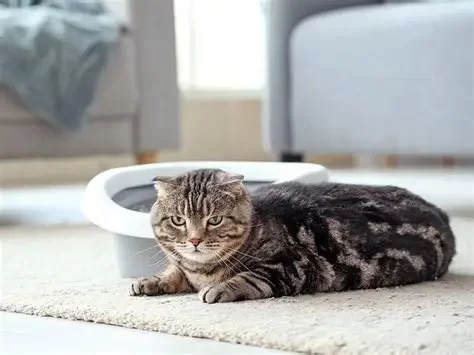- understanding-why-cats-pee-outside-the-litter-box
- medical-reasons-you-cant-ignore
- environmental-triggers-and-litter-box-preferences
- behavioral-issues-and-stress-responses
- real-case-study-from-a-cat-owner
- how-hidden-brook-veterinary-can-help
1. Understanding Why Cats Pee Outside the Litter Box
Few things frustrate cat owners more than finding a puddle of urine outside the litter box. It's not just messy—it’s confusing. Why is a perfectly house-trained pet suddenly eliminating in the wrong places? Understanding what drives a cat to pee outside the litter box is the first and most important step toward fixing the problem.
This behavior is never random. It’s your cat’s way of communicating that something is wrong—whether it’s a medical issue, environmental discomfort, or emotional distress. Cats are clean, territorial animals. When they deviate from the norm, there’s always a reason. Unfortunately, this is often misunderstood by owners, who may mistake it for "bad behavior" rather than a symptom of an underlying issue.
Addressing the root cause early prevents the behavior from becoming a habit. At Hidden Brook Veterinary, we often remind owners: your cat isn’t misbehaving—they’re trying to tell you something. Listening carefully and taking thoughtful action can restore harmony in your home—and your cat’s health and comfort.
2. Medical Reasons You Can’t Ignore
Many litter box problems have medical origins. One of the most common culprits is feline lower urinary tract disease (FLUTD), a condition that includes inflammation, infection, and even urinary blockages. These issues are painful and can cause your cat to associate the litter box with discomfort, leading them to avoid it.
Other potential medical triggers include:
- Urinary tract infections (UTIs)
- Kidney disease
- Diabetes
- Arthritis (making it painful to climb into the litter box)
- Hyperthyroidism
At Hidden Brook Veterinary, we’ve treated cats whose owners waited months before seeking help—only to discover a condition that could have been easily treated with medication or dietary changes. If your cat is peeing outside the litter box suddenly and frequently, a vet visit is essential. We recommend urine tests and bloodwork to rule out infection or organ dysfunction. Catching these conditions early can improve your cat’s quality of life—and save you from costly damage or repeated clean-ups.
3. Environmental Triggers and Litter Box Preferences
Even healthy cats can be picky about their bathroom environment. Dirty litter boxes, wrong litter type, poor placement, or limited access can all drive your cat away. Understanding what your cat prefers can mean the difference between a happy pet and a stained carpet.
3.1. Cleanliness is Critical
Cats dislike using a box that smells or has clumps. Boxes should be scooped at least once a day and completely cleaned weekly. Unscented clumping litter is often best tolerated.
3.2. Placement Matters
A litter box near noisy appliances or in high-traffic areas may deter use. Cats prefer quiet, low-stress zones where they feel safe while eliminating.
3.3. One Box Per Cat, Plus One
If you have multiple cats, competition or overcrowding can lead to avoidance. The golden rule is one litter box per cat, plus one extra.
We’ve seen success at Hidden Brook Veterinary simply by adjusting box location and switching litter brands. One client’s 8-year-old tabby stopped peeing on the bed after they moved the litter box out of the laundry room, where the dryer noise was startling him.
4. Behavioral Issues and Stress Responses
Like people, cats respond to stress in different ways. For some, peeing outside the litter box is their coping mechanism. Common stressors include:
- Moving to a new home
- New pets or people in the household
- Routine changes (e.g., work schedules)
- Conflicts with other animals
Stress peeing is especially common among cats with anxiety or a history of trauma. In these cases, pheromone diffusers like Feliway, play therapy, and environmental enrichment can help. Providing multiple high perches, hiding spots, and play sessions with wand toys reduce stress and restore confidence.
Behavioral modification may take time. One of our patients, a rescue named Leo, began marking after his owner brought home a new puppy. With the help of Hidden Brook Veterinary’s behavioral consult, Leo was given a quiet room, more one-on-one time, and anti-anxiety supplements. After three weeks, his inappropriate urination stopped entirely.
5. Real Case Study from a Cat Owner
Sarah, a client from New York, brought her 6-year-old cat Max to Hidden Brook Veterinary after weeks of him urinating behind furniture. She had tried changing litter, cleaning more frequently, and even used home sprays, but nothing worked. Our team ran a urinalysis and found early-stage crystals in Max’s urine—a precursor to urinary blockage.
After switching to a prescription urinary diet and providing more hydration options (adding water fountains and wet food), Max returned to using his litter box consistently. Sarah later shared, “I thought it was stress, but I’m so glad I didn’t wait. I might’ve lost him if I ignored it.”
This story reinforces the importance of not jumping to conclusions. Sometimes, what looks like behavior is really biology. Getting a proper diagnosis is essential before trying over-the-counter fixes.
6. How Hidden Brook Veterinary Can Help
If your cat is peeing outside the litter box, you’re not alone—and it’s not hopeless. At Hidden Brook Veterinary, we take a holistic and compassionate approach. We start with a complete physical exam, run diagnostics as needed, and work with you to create a customized plan. Whether the cause is medical, environmental, or behavioral, we’ll find a solution tailored to your cat’s needs.
We also provide post-treatment support and check-ins to monitor progress. For ongoing cases, our behavior specialists offer in-home evaluations and enrichment plans that reduce stress and restore litter box habits. And for medical conditions, we offer advanced diagnostics and minimally invasive treatment options for your cat’s comfort.
Your cat deserves to feel safe and well—and so do you. Let Hidden Brook Veterinary be your trusted partner in keeping your pet happy, healthy, and dry.












